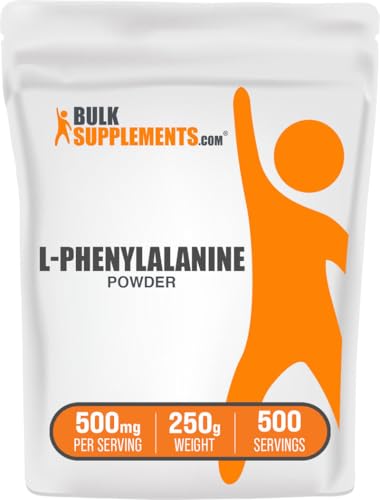Phenylalanine and Depression: What the Research Says
Quick Summary: Research suggests a link between the amino acid phenylalanine and depression. Studies show that people with depression often have different levels of phenylalanine in their blood compared to those without depression.
What The Research Found
Scientists looked at many studies on depression, both in people and in animals. They found that phenylalanine, along with other substances in the body, is often out of balance in people with depression. This means that the levels of phenylalanine in the blood may be higher or lower than normal. This research doesn't prove that phenylalanine causes depression, but it suggests it might be connected to the condition. The study also looked at how these changes in the body might affect things like inflammation and energy levels.
Study Details
- Who was studied: The research looked at 26 studies on people with major depressive disorder (MDD) and 78 studies on animals that showed signs of depression.
- How long: The studies included were published between 2000 and 2023.
- What they took: This study didn't involve people taking phenylalanine. Instead, researchers looked at the natural levels of phenylalanine and other substances in the body.
What This Means For You
This research is a starting point. It suggests that measuring phenylalanine levels might one day help doctors understand and diagnose depression better. However, it's important to remember:
- Don't self-treat: This study doesn't mean you should start taking phenylalanine supplements for depression. Always talk to your doctor before taking any supplements.
- More research needed: Scientists need to do more studies to understand the exact role of phenylalanine in depression.
Study Limitations
- Missing data: The researchers couldn't combine all the study results because some important information was missing.
- Different studies: The studies included used different methods and looked at different groups of people, which can make it hard to compare results.
- Animal models: Animal studies don't always perfectly reflect what happens in humans.
Technical Analysis Details
Key Findings
The study identified phenylalanine as one of 9 metabolites consistently altered in both clinical (human) and animal studies of major depressive disorder (MDD). Specifically, phenylalanine levels were dysregulated in blood samples alongside other amino acids (e.g., tryptophan, tyrosine) and metabolites (e.g., pyruvate, kynurenic acid). Pathway analysis highlighted 14 disrupted metabolic processes shared between human and animal models, including inflammation, oxidative stress, and energy metabolism, suggesting phenylalanine’s potential role in MDD-related molecular mechanisms.
Study Design
This was a systematic review and meta-analysis of metabolomics studies on depression. Researchers analyzed 26 clinical studies (n = 1,500–2,000 MDD patients, though exact pooled sample size unclear) and 78 animal studies (primarily murine models). Data were sourced from PubMed and Web of Science (2000–2023). MetaboAnalyst 5.0 was used for pathway analysis. The study focused on identifying high-frequency metabolites reported in ≥66% of studies but did not conduct quantitative meta-analysis due to missing original data (e.g., effect sizes, raw values).
Dosage & Administration
Not applicable. The study did not evaluate phenylalanine supplementation or interventions; it analyzed endogenous metabolite levels in MDD patients and animal models.
Results & Efficacy
Phenylalanine was among the top 55 high-frequency metabolites in clinical studies and 77 in animal studies. While the study confirmed its consistent dysregulation in depression research, no specific effect sizes, p-values, or confidence intervals were reported for phenylalanine itself, as the analysis focused on cross-study frequency rather than quantitative pooling. The overlap of metabolites (e.g., phenylalanine, tyrosine) between species suggests conserved metabolic pathways in MDD pathophysiology.
Limitations
- Lack of original data: The inability to perform meta-analysis due to missing effect-size data limited quantitative conclusions.
- Confounding factors: Clinical studies varied in patient demographics, medication use, and comorbidities, which could influence metabolite levels.
- Animal model limitations: Murine models may not fully capture human depression complexity.
- Tissue specificity: Metabolite changes were observed in blood/urine but not directly in brain tissue, leaving causal mechanisms unclear.
- Publication bias: Studies with significant results may be overrepresented.
Clinical Relevance
This study positions phenylalanine as a potential biomarker for MDD, alongside other metabolites, but does not establish therapeutic applications. For supplement users, the findings do not support phenylalanine as a treatment for depression. Instead, they highlight the need for further research to determine whether metabolite dysregulation (including phenylalanine) contributes to MDD pathology or reflects secondary effects. Clinicians should interpret these results cautiously, as biomarker identification does not equate to diagnostic or intervention efficacy. Future studies could explore targeted modulation of these pathways to develop novel therapies.
Note: The study does not provide demographic details (age, sex, ethnicity) of clinical cohorts, and no dosing or efficacy data for phenylalanine supplementation.
Original Study Reference
Metabolomics on depression: A comparison of clinical and animal research.
Source: PubMed
Published: 2024
📄 Read Full Study (PMID: 38211744)




